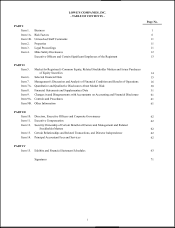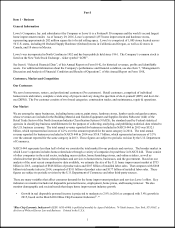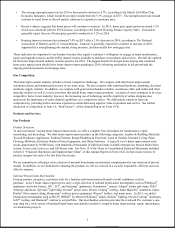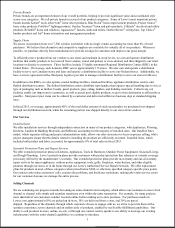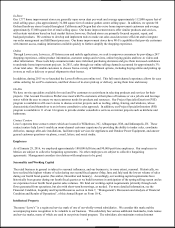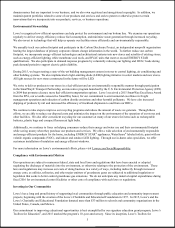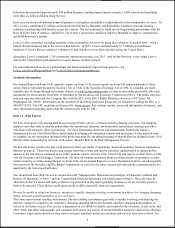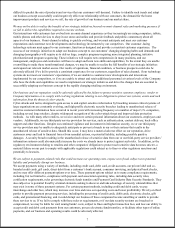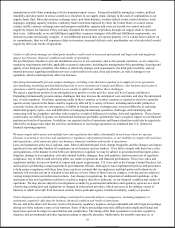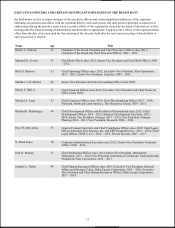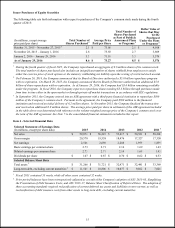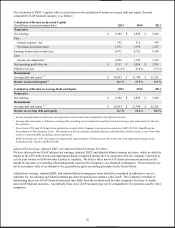Lowe's 2015 Annual Report Download - page 19
Download and view the complete annual report
Please find page 19 of the 2015 Lowe's annual report below. You can navigate through the pages in the report by either clicking on the pages listed below, or by using the keyword search tool below to find specific information within the annual report.
10
manufacturers with China continuing to be the dominant import source. Financial instability among key vendors, political
instability and labor unrest in source countries or elsewhere in our supply chain, changes in the costs of commodities in our
supply chains (fuel, labor and currency exchange rates), port labor disputes, weather-related events, natural disasters, work
stoppages, shipping capacity restrains, retaliatory trade restrictions imposed by either the United States or a major source
country, tariffs, currency exchange rates and transport availability, capacity and costs are beyond our control and could
negatively impact our business if they seriously disrupted the movement of products through our supply chain or increased
their costs. Additionally, as we add fulfillment capabilities or pursue strategies with different fulfillment requirements, our
network becomes increasingly complex. If our fulfillment network does not operate properly or if a vendor fails to deliver on
its commitments, then we will experience delay in inventory, increased delivery costs, merchandise out-of-stocks which would
negatively affect our results of operations.
Failure to effectively manage our third party installers could result in increased operational and legal risks and negatively
impact our business, financial condition and results of operations.
We use third party installers to provide installation services to our customers, and, as the general contractor, we are subject to
regulatory requirements and risks, applicable to general contractors, including the management of the permitting, licensing and
quality of our third party installers. Our failure to effectively manage such requirements, the third party installers, and our
internal processes regarding installation services could result in lost sales, fines and lawsuits, as well as damage to our
reputation, which could negatively affect our business.
Operating internationally presents unique challenges, including some that have required us to adapt our store operations,
merchandising, marketing and distribution functions to serve customers in Canada and Mexico. Our business and results of
operations could be negatively affected if we are unable to effectively address these challenges.
We expect a significant portion of our anticipated store growth over the next five years will be in Canada and Mexico.
Expanding internationally presents unique challenges that may increase the anticipated costs and risks, and slow the anticipated
rate, of such expansion. Our future operating results in these countries or in other countries or regions in which we currently
operate or may operate in the future could be negatively affected by a variety of factors, including unfavorable political or
economic factors, adverse tax consequences, volatility in foreign currency exchange rates, increased difficulty in enforcing
intellectual property rights, costs and difficulties of managing international operations, challenges with identifying and
contracting with local suppliers and other risks created as a result of differences in culture, laws and regulations. These factors
could restrict our ability to operate our international businesses profitably and therefore have a negative impact on our financial
position and results of operations. In addition, our reported results of operations and financial position could also be negatively
affected by exchange rates when the activities and balances of our foreign operations are translated into U.S. dollars for
financial reporting purposes.
We must comply with various and multiple laws and regulations that differ substantially in each area where we operate.
Changes in existing or new laws and regulations or regulatory enforcement priorities, or our inability to comply with such laws
and regulations, could adversely affect our business, financial condition and results of operations.
Laws and regulations at the local, regional, state, federal and international levels change frequently, and the changes can impose
significant costs and other burdens of compliance on our business and our vendors. If we fail to comply with these laws, rules
and regulations, or the manner in which they are interpreted or applied, we may be subject to government enforcement action,
litigation, damage to our reputation, civil and criminal liability, damages, fines and penalties, and increased cost of regulatory
compliance, any of which could adversely affect our results of operations and financial performance. These laws, rules and
regulations include, but are not limited to, import and export requirements, U.S. laws such as the Foreign Corrupt Practices Act,
and local laws prohibiting corrupt payments to governmental officials. Although we have implemented policies and procedures
to help ensure compliance with these laws, there can be no certainty that our employees and third parties with whom we do
business will not take actions in violation of our policies or laws. Many of these laws are complex, evolving and are subject to
varying interpretations and enforcement actions. Any changes in regulations, the imposition of additional regulations, or the
enactment of any new legislation could have an adverse impact, directly or indirectly, on our financial condition and results of
operations. We may also be subject to investigations or audits by governmental authorities and regulatory agencies as a result
of enforcing existing laws and regulations or changes in enforcement priorities, which can occur in the ordinary course of
business or which can result from increased scrutiny from a particular agency towards an industry, country or practice.
Future litigation or governmental proceedings could result in material adverse consequences, including judgments or
settlements, negatively affecting our business, financial condition and results of operations.
We are, and in the future will become, involved in lawsuits, regulatory inquiries, and governmental and other legal proceedings
arising out of the ordinary course of our business. Some of these proceedings may raise difficult and complicated factual and
legal issues and can be subject to uncertainties and complexities. The timing of the final resolutions to lawsuits, regulatory
inquiries, and governmental and other legal proceedings is typically uncertain. Additionally, the possible outcomes of, or


